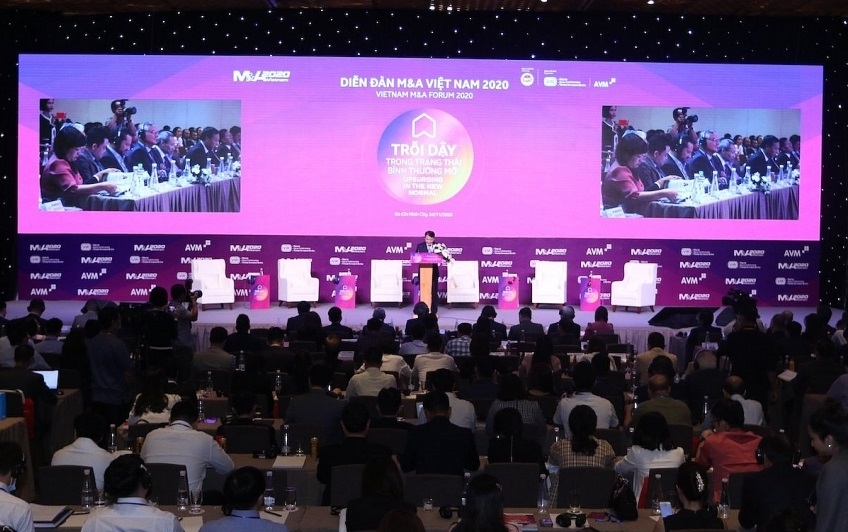New demand dictates retail surge for M&A
 |
| New demand dictates retail surge for M&A |
Speaking at the Vietnam M&A Forum 2020 organised by VIR, Paul DiGiacomo, senior managing director of BDA Capital, said that Vietnam’s mergers and acquisitions (M&A) market is becoming more mature as buyers have more long-term visions. The country’s growing consumption power and expanding middle class have attracted international brands from Japan, Thailand, and many more, with some million-dollar deals concluded.
Earlier this year, Masan HPC Co., Ltd., a wholly-owned subsidiary of Masan Consumer Corporation (MCH), successfully acquired 52 per cent of Net Detergent JSC. The move marks Masan’s entrance into the $3.1 billion local personal and home care market.
More recently, Masan MEATLife announced it would enter the poultry market by buying a 51-per-cent stake in 3F VIET JSC, a leading player in the industry, for VND613 billion ($26.65 million).
Danny Le, general director of Masan Group, said that the company is stepping up its M&A efforts to capitalise on the lucrative domestic market and has extended its product lines ranging from seasoning to instant noodles and beverages.
Le added that Masan has developed a 5-year strategy to broaden its product portfolio, which serves nearly the entire country. The company aims to acquire local firms that have state-of-the-art technology to manufacture high-quality products at reasonable prices. Its acquisitions are hoped to expand its distribution network and build a strong local brand in the domestic market.
Similarly, Vinamilk officially became the parent company of GTNFoods after finalising the purchase of 79.5 million GTN shares to raise its holding to 75 per cent. After the transaction, Vinamilk also owns 51 per cent in Moc Chau Milk, which is a subsidiary of GTNFoods.
Elsewhere, Thai-backed Central Group of announced spending VND2.66 trillion ($115.7 million) to complete the acquisition of Nguyen Kim, after five years of holding a 49 per cent in the electronics retailer.
The official entry into force of the EU-Vietnam Free Trade Agreement (EVFTA) is expected to further drive the interest of investors in Vietnam’s retail market. Phong Quach, head of Strategy3 at Ipsos Vietnam, said that with the impact of the pandemic to the global economy, the abolishment of Economic Needs Test – a requirement once viewed as a considerable barrier for foreign investment in retail – may not result in a large stream of direct retail investment from EU corporations into Vietnam.
However, since EU investors need to acquire knowledge and a supplier network here, M&A may be a more viable method for market entry. “We have not seen any sign for a significant upward trend regarding M&A in Vietnam’s retail market from EU investors. Even though M&As transactions are becoming an attractive method of market entry for EU investors, the local retail market remains a challenge to be solved,” Quach said.
Nevertheless, he added, with Vietnam’s GDP growth set to be among the world’s highest in 2020 and expected growth in 2021 to be closer to 2019’s rate, the Vietnamese retail landscape could see a good recovery in 2021, which will draw many investors’ attention amidst the upcoming lockdown in the EU.
A survey from Ipsos Vietnam in September showed that Vietnamese consumers generally crave for a better economy that is stronger than regional ones. “However, both the expected market growth and regulatory potential from the EVFTA will not be enough to eclipse the changing retail dynamic in Vietnam. Our survey results also show that the growth in takeaway orders and e-commerce could suggest an omnichannel landscape with changed shopping behaviour to come in Vietnam,” Quach said. EU investors will likely try to foresee how this landscape will be changing so that they can accurately select the most appropriate players to invest in.
Matthieu Francois, associate partner of McKinsey & Company said, “We have not yet seen large deals between foreign investors and local retailers, but a lot of elements seem to converge in this direction. Local players are typically taking the lion’s share of the market in most retail categories and might, at some point, face increased need for funding.”
However, foreign retail concepts do not easily resonate with Vietnamese buyers who are generally loyal to local brands, except for convenience stores.
“This might urge foreign players to consider investments in local ventures that could be more attractive to some than a greenfield venture, while also holds appeal for local players that are looking to lift their profitability,” Francois added.
What the stars mean:
★ Poor ★ ★ Promising ★★★ Good ★★★★ Very good ★★★★★ Exceptional
Related Contents
Latest News
More News
- BJC to spend $723 million acquiring MM Mega Market Vietnam (January 22, 2026 | 20:29)
- NamiTech raises $4 million in funding (January 20, 2026 | 16:33)
- Livzon subsidiary seeks control of Imexpharm (January 17, 2026 | 15:54)
- Consumer deals drive Vietnam’s M&A rebound in December (January 16, 2026 | 16:08)
- Southeast Asia tech funding rebounds on late-stage deals (January 08, 2026 | 10:35)
- DKSH to acquire Vietnamese healthcare distributor Biomedic (December 24, 2025 | 15:46)
- Central Retail refocuses Vietnam strategy with Nguyen Kim exit (December 24, 2025 | 15:01)
- RongViet Securities wins sixth consecutive M&A advisory award (December 22, 2025 | 17:30)
- Kido Group divests from ice cream and frozen foods (December 18, 2025 | 16:49)
- Insurtech startup Saladin wraps up Series A funding round (December 17, 2025 | 09:10)

 Tag:
Tag:


















 Mobile Version
Mobile Version